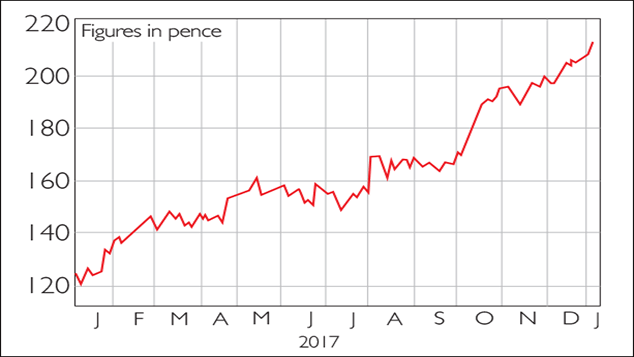Tempting punts on a troubled business
The latest profit warning from Provident Financial looks like an almighty mess, but its retail bonds may have fallen further than is justified.

Get the latest financial news, insights and expert analysis from our award-winning MoneyWeek team, to help you understand what really matters when it comes to your finances.
You are now subscribed
Your newsletter sign-up was successful
Want to add more newsletters?

Twice daily
MoneyWeek
Get the latest financial news, insights and expert analysis from our award-winning MoneyWeek team, to help you understand what really matters when it comes to your finances.

Four times a week
Look After My Bills
Sign up to our free money-saving newsletter, filled with the latest news and expert advice to help you find the best tips and deals for managing your bills. Start saving today!
The latest profit warning from Provident Financial looks like an almighty mess, with a corporate restructuring in its core business of door-step lending tripping the business into disaster. The firm's shares fell more than 65% in a day, while its listed retail bonds have also been badly hit. PF17, which matures on 4 October 2017, is trading at around £95 against a maturity value of £100. The obviously more risky PF21, which matures in 2021 and pays a coupon of 6%, is trading at around £70.
We shouldn't be surprised by this development. Many retail investors will have seen the carnage in the share price and decided to get out, mindful of the old adages about "no smoke without fire" and "profit warnings come in threes" (this is the second in three months). However, a look at the business suggests this may be an overreaction.
I am no expert on this firm, but its current market cap is at around £660m versus group net assets of £731m (although that assets figure was before the profits warning, so there is a risk of write-downs). Other threats include the possibility of a run on the successful Vanquis Bank bit of the business but this seems to be solidly profitable, with profit before tax of £100m at the interims. The profits warning did come with news that a supplementary product sold by the bank was being suspended. Moneybarn, which provides vehicle loans, also seems to be trading solidly.
MoneyWeek
Subscribe to MoneyWeek today and get your first six magazine issues absolutely FREE

Sign up to Money Morning
Don't miss the latest investment and personal finances news, market analysis, plus money-saving tips with our free twice-daily newsletter
Don't miss the latest investment and personal finances news, market analysis, plus money-saving tips with our free twice-daily newsletter
So common sense suggests that although the equity shareholders could be wiped out, bond holders might be safe. There's still a lot of capital to eat through before they would have to suffer losses. My guess is that the banking covenants will very soon be triggered and there will be some searching discussions with the lenders, but it seems to me, at this initial stage, that the retail bonds may have fallen further than is justified.
The most obvious opportunity is PF17, given that it matures in just two months' time. The firm might fail to repay it, but if that was to happen, I assume we'd be looking at an immediate corporate bankruptcy. So investors might get a nice 5% bounce very quickly.
Obviously, with the longer dated PF21 issue, there's a lot more work that would need to be done in terms of research into the balance sheet. This is now clearly a speculative junk bond and the current price looks about right for that, but I think there may be some upside if the new management fixes the firm's broken internal systems. If the bonds pay out in full until 2021, which is clearly a big risk, then at the time of writing we're looking at a running yield of around 8.5% and yield to maturity of about 16.5%.
Get the latest financial news, insights and expert analysis from our award-winning MoneyWeek team, to help you understand what really matters when it comes to your finances.

David Stevenson has been writing the Financial Times Adventurous Investor column for nearly 15 years and is also a regular columnist for Citywire.
He writes his own widely read Adventurous Investor SubStack newsletter at davidstevenson.substack.com
David has also had a successful career as a media entrepreneur setting up the big European fintech news and event outfit www.altfi.com as well as www.etfstream.com in the asset management space.
Before that, he was a founding partner in the Rocket Science Group, a successful corporate comms business.
David has also written a number of books on investing, funds, ETFs, and stock picking and is currently a non-executive director on a number of stockmarket-listed funds including Gresham House Energy Storage and the Aurora Investment Trust.
In what remains of his spare time he is a presiding justice on the Southampton magistrates bench.
-
 ISA fund and trust picks for every type of investor – which could work for you?
ISA fund and trust picks for every type of investor – which could work for you?Whether you’re an ISA investor seeking reliable returns, looking to add a bit more risk to your portfolio or are new to investing, MoneyWeek asked the experts for funds and investment trusts you could consider in 2026
-
 The most popular fund sectors of 2025 as investor outflows continue
The most popular fund sectors of 2025 as investor outflows continueIt was another difficult year for fund inflows but there are signs that investors are returning to the financial markets
